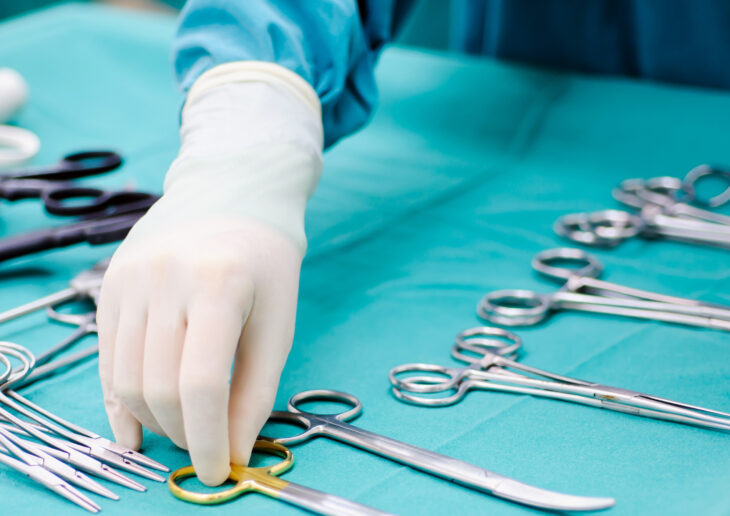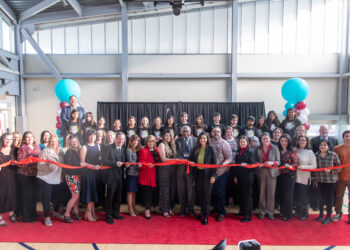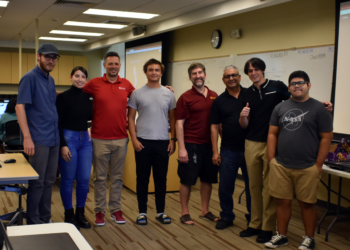Equipped for Success: Sterile Tech Program Tackles Critical Industry Shortage

They say success is infectious. And for the future graduates of College of the Desert’s new Sterile Tech program, it’ll be the only thing going viral.
Working behind the scenes in support of surgeons and doctors, Sterile Techs prepare equipment and supplies for hospitals and operating rooms. And though these health care professionals are life-and-death essential when it comes to keeping medical instruments and environments clean, they are becoming increasingly hard to come by.
“We have 27 openings right now. … Which of your colleges has sterile processing?’” IEDRC Health Industry Sector Manager Wendy Deras recalls being asked by an industry partner. “I said, ‘None of them.’”
At the time, not one of the 12 Inland Empire community colleges offered a perioperative program to train pre- and post-surgery care professionals. But with the critical need apparent, Deras was determined to change that. The first step? Teaming up with Veronica Izurieta, Program Manager of College of the Desert’s Partnership and Community Education (PaCE), to see how the region’s colleges could help fill the demand.
“We were in the midst of COVID,” Izurieta remembers. When research revealed that the demand was indeed strong and region-wide, the college pulled in industry experts to get the initial training off the ground. “We applied for regional Strong Workforce because we knew there was a need out there.
“Our goal is to provide skillsets for immediate employment.”
The first regional perioperative advisory committee meeting was held in January of 2021 and called on interested colleges, industry partners, and experts to inform the first not-for-credit training. Says Deras, “Our region has really picked up on the fact we can use short-term, Strong Workforce training dollars to start programs now.”
So far, two cohorts have gone through the training, and more than a dozen students are currently receiving their certificates of completion and starting the required 400-hour externships.
“They immediately were placed into the new positions or upskilled in pay, so it’s already taken immediate effect,” beams Izurieta. “It’s all the skillsets that are needed to sterilize equipment prior [and after] a surgery or any procedure.”
College of the Desert offered the program to community members, as well as incumbent workers at Eisenhower Health, JFK Memorial Hospital, and Arrowhead Regional Medical Centers. The offering was timely, according to Eisenhower Health Supervisor and Anesthesia Technician Kimberly Lilly, who agrees that a passion for sterile technology can be contagious.
“This has been a wonderful opportunity for the Central Sterile Processing staff,” says Lilly. “I have enjoyed following up with those who are in the course and listening to their excitement, watching them support one another, and seeing them challenge each other to do better.”
The PaCE program recently received a second round of funding through the regional Strong Workforce to continue training and help fill the need for more technicians. But the region’s colleges aren’t stopping at the not-for-credit program. While the next cohort of sterile techs is getting off the ground, colleges will be busy developing stackable, for-credit programs in the perioperative field.
It’s a groundbreaking moment for the region and the state, according to the sector manager.
“There are some isolated community colleges doing sterile tech and central processing,” explains Deras. “But I don’t think they’ve really grabbed hold of the perioperative career ladder because it’s not as talked about.”
Demand is critical, but help is on the way. Leading experts in the field are guiding perioperative curriculum development. Currently, San Bernardino Valley College is writing a for-credit curriculum for surgical techs and sterile processing. Meanwhile, Riverside City College is creating an associate degree program for anesthesiology techs, in which grads can command $100,000 a year … without a four-year degree or the related debt.
“A sterile processor could go anywhere — RN, anesthesiologist tech, surge [surgical] tech,” explains Deras. “It is a perioperative ladder.”
As programs grow, entire career pathways in the field will be available at the region’s community colleges, starting with the entry-level sterile processing position. With such certification comes advanced job opportunities and increased salaries, commanding an average income of $47,000 a year.
According to the Inland Empire Top Critical Workforce 2021 report, sterile techs were 32nd on the list of needed workers in all sectors. Meanwhile, regional employment is projected to increase by 13% by 2023. From hospitals to outpatient surgery centers, dental clinics, and even veterinary hospitals, the need is rising.
“There has always been a demand, especially in our region, because we don’t have a lot of programs to fill that need,” says Deras. With increased retirement in the field, she says demand is soaring to the point where hospitals are pulling in techs from Orange County: “Having our own programs in our region was a long time in coming.”
It’s still a work in progress, but Izurieta says she is encouraged by the positive feedback that incumbent worker participants have shared.
“We just got through our first program, and we’re just starting to see some of the success.”
Industry partners, like JFK Memorial Hospital, couldn’t be more pleased with the progress. The hospital sent four students to the last cohort and plans to send up to six more for the next round.
“These students will be more prepared for the exam, and when they pass the test, they can apply for Lead Tech or Tech II and have an increase in salary,” says Marcos Arroyo, Manager of Sterile Processing. “This program really helps us.”
Not only do programs like these expose high-paying pathways to immediate employment, but they also show current hospital employees that there’s room for growth in the health care field. For Michelle DeVee, Supervisor at Arrowhead Regional Medical Center, this upward mobility is crucial for retaining top talent.
“Upskilling current workers assists our hospital because it promotes from within, and strong employees will gain skills and job satisfaction,” says DeVee. “This program is giving employees an opportunity to progress in their careers.”
As the Sterile Tech program thrives, the college continues to strengthen industry partnerships in the region, leading to broader participation and more clinical sites for regional nursing programs.
“We want to give something back,” says Deras, who considers the dual mission of helping hospitals and upskilling workers a “true partnership.”
“We’re making them safer and more competent, which is what we want in our operating rooms.”




